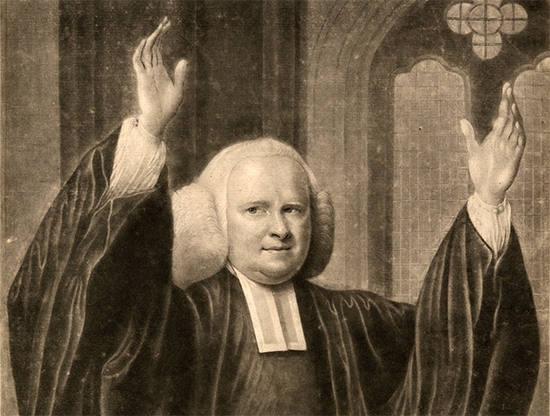
February-
March 2023
Servant's Heart
------------------
|





PRIMARY SOURCE: Preaching From Under the Pulpit
Hebrews 11:4b: “He being dead yet speaketh.”
George Whitefield (1714–1770) was a cross-eyed preacher. Childhood measles left his eyes out of alignment. Mockers called him "Dr. Squintum." That didn’t stop him, however, from becoming perhaps the world’s greatest evangelist.
Though an Oxford graduate, he relied more on heart than head. The eternal significance of preaching weighed on him. He regularly threw up before he spoke. He wept through his sermons, as did his listeners.
Whitefield often preached in the open air. A Connecticut farmer told of joining “a steady stream of horses and their riders,” hurrying to hear the evangelist. The combined hoofbeats, he said, sounded like “low rumbling thunder” and stirred up dust thick as fog. Newspapers reported Whitefield sometimes preached to thirty thousand. Not believing a voice could carry that far, Benjamin Franklin attended a sermon, did some calculations, and quickly changed his mind.
The Englishman encouraged the desperate: “There are no incurables in Christ's hospital.” He convicted the undisciplined: “If people cannot use so much self-denial as to rise early to pray, I know not how they will be able to die at a stake (if called to it) for Jesus Christ.” He challenged the apathetic: “Did He come down from Heaven, and shed His precious blood, to purchase these hearts of ours, and shall we only give Him half of them?”
Whitefield combined drama with sincerity. A prominent actor said he’d pay a hundred guineas to be able to say “Oh!” the way Whitefield did. Others said he could make crowds weep by how he pronounced “Mesopotamia.” Along with dramatic gestures, sincerity shone through. Everyone knew Whitefield believed what he preached.
This combination of gifts gripped his hearers, sometimes leading to emotional excess. His first sermon was said to have driven 15 people mad. After Whitefield referred to sinful hearts “crawling with Toads of Corruptions,” one middle-aged woman reported feeling them “crawling up my Throat.” In Scotland, a 40-year-old man confessed: “I fell under great Terror…Hell was represented to my mind, as a Pit at the foot of a Hill, and a great drove of people marching into it, and I along with them.”
Whitefield preached his last sermon September 29, 1770, dying the next day in Newburyport, Massachusetts. As requested, they buried him under the pulpit of the Presbyterian church.
He continued to preach after his death. Benjamin Randall, founder of the Free Will Baptist movement in New England, heard Whitefield three times. After a man reported the evangelist’s death. Randall wrote: “As soon as his voice reached my ears, an arrow from the quiver of the Almighty struck my heart and a mental voice louder than thunder pierced through my soul. The first thoughts that passed through my mind were: ‘Whitefield is now in Heaven and I am on the road to Hell. I shall never hear his voice anymore…He taught me the way to Heaven but I regarded it not…I would sacrifice anything to hear it again.’”
Two weeks later, Randall, thinking on Whitefield’s sermons, bowed the knee to Jesus.
About the Columnist: Paul V. Harrison has pastored Madison FWB Church in Madison, Alabama since 2015. Previously, he pastored Cross Timbers FWB church in Nashville, Tennessee, for 22 years. He was an adjunct professor at Welch College for 17 years, teaching church history and Greek. Paul is the creator of Classic Sermon Index, a subscription-based online index of over 66,000 sermons, with clients including Harvard, Baylor, and Vanderbilt, among others: classicsermonindex.com. |
| |
|

